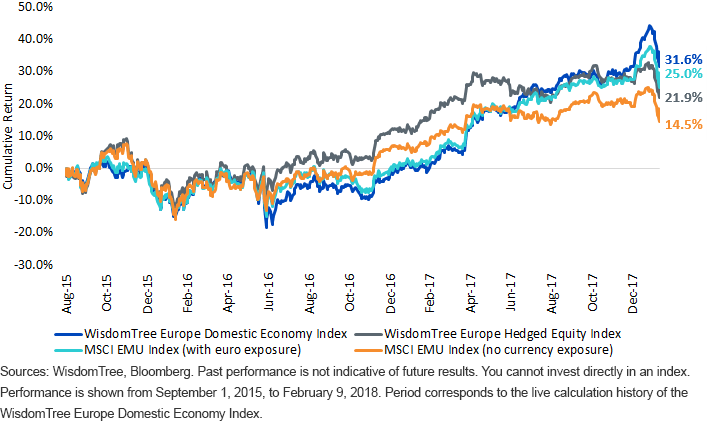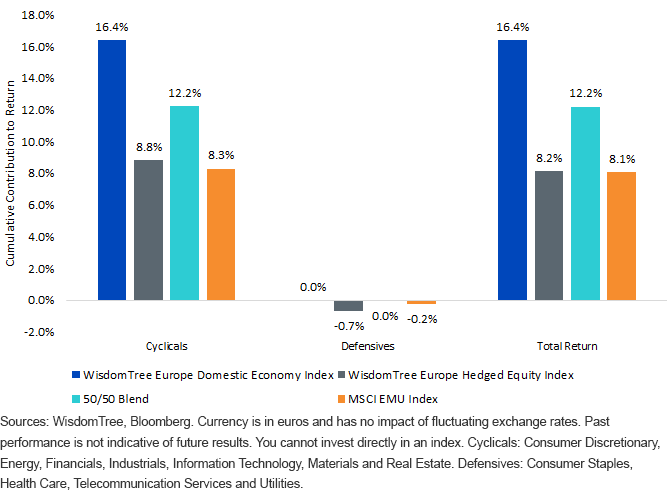How to Add Emphasis to the Cyclical Sectors of Europe



Recent bouts of rather extreme volatility notwithstanding, as U.S. equities have performed strongly over the past few years, more and more investors have been asking, “Where might I invest new money coming in?”
What they were really saying: With U.S. equities at elevated levels, it is harder and harder to continue to make allocations.
International equities, and Europe in particular, might be poised for a run of outperformance.
European Economy Showing Signs of Strength
Europe has been enjoying increased economic growth and aggregate demand. At a recent monetary policy conference in Frankfurt, Dr. Jens Weidmann, president of the Bundesbank, described the state of the European economy in the following manner:
As Mario Draghi pointed out recently, what started out as a recovery is now a fully fledged expansion. It is robust and broad-based, with most countries and sectors posting positive growth figures. As a result, the euro area grew even faster than the U.S. economy last year. After years of challenges, the euro area is now driving global growth, not dragging it down. And indicators show no sign of growth abating anytime soon. In many respects, the euro-area economy might be further along now than the U.S. economy at the time the Fed ended its net asset purchases.
Currency Appreciation: What We Were Not Expecting One Year Ago
One year ago, we were aligned with many in thinking that the euro was more likely to tilt toward depreciation than appreciation. The approximate 15% appreciation against the U.S. dollar from February 9, 2017, to February 9, 2018, showed us all just how tricky trying to predict currency markets can be.
Even the British pound has been appreciating while we all wait for a little more than a year to figure out just what “Brexit” may entail.
Two Opposite Ways of Looking at European Equities
The revival of growth in Europe has led to a dramatic performance differential breaking out between local economy European stocks and those that are more global in nature. WisdomTree has two distinct Indexes designed to represent opposing market environments.
Many investors are familiar with the currency-hedged exporters basket that was in favor during periods of euro weakness. They may be less aware of the cyclical recovery basket that has exposure to both the euro and the more local economy sectors and stocks that are benefiting from this economic growth momentum.
- WisdomTree’s exporter basket is represented by the WisdomTree Europe Hedged Equity Index, which also hedges exposure to the euro and does not benefit when the euro rises but does not get hurt when euro falls.
- The WisdomTree Europe Domestic Economy Index began its live calculation on September 1, 2015. It has exposure to companies with more than 50% of their revenue from within the local economy and excludes more defensive sectors (Telecom, Utilities, Health Care, Consumer Staples) to represent the more cyclical elements of the European economy. We designed this Index two years ago in anticipation that there could be a cyclical recovery under way for which investors would want more optimized exposure.
WisdomTree European Equity Index Performance

- This period is interesting for a few reasons. First, from about mid-2016 to mid-2017, the WisdomTree Europe Hedged Equity Index performed quite strongly as the euro depreciated in value against the dollar. Then, when the euro’s performance shifted toward appreciation, the WisdomTree Europe Domestic Economy Index saw a very strong performance jump, as it is designed to both tap into the European domestic recovery that has been at the forefront of many conversations as well as have exposure to the euro’s appreciation.
Cyclical Sectors Have Led European Equities Higher over the Past Year
This concept of cyclical sectors has been an important one given the revival of domestic demand and positive growth impulses coming from the European economy. With a shifting growth environment, cyclical equity exposures are outperforming defensive equity exposures, and this trend may still be in early phases.
Domestic Recovery Theme Will Start to Trump Quantitative Easing
Raising Cyclical Exposure Tapped into the Recent Trend (February 9, 2017, to February 9, 2018)

The WisdomTree Europe Domestic Economy Index, by design, derives all of its return from the cyclical sectors of Europe’s equity market. Over the past year, there has been no question that these are the sectors that have been driving performance. Whether looking at the WisdomTree Europe Domestic Economy Index or the WisdomTree Europe Hedged Equity Index, it is apparent that nearly all of the contribution to total returns—measured in euros so as to negate the impact of the difference in currency exposure—came from the cyclical sectors. If one had blended these two strategies together over this period, the return of the export-oriented equities would have been raised by about 4%.
Important Risks Related to this Article
Investments focused in Europe increase the impact of events and developments associated with the region, which can adversely affect performance.

Jeremy Schwartz has served as our Global Chief Investment Officer since November 2021 and leads WisdomTree’s investment strategy team in the construction of WisdomTree’s equity Indexes, quantitative active strategies and multi-asset Model Portfolios. Jeremy joined WisdomTree in May 2005 as a Senior Analyst, adding Deputy Director of Research to his responsibilities in February 2007. He served as Director of Research from October 2008 to October 2018 and as Global Head of Research from November 2018 to November 2021. Before joining WisdomTree, he was a head research assistant for Professor Jeremy Siegel and, in 2022, became his co-author on the sixth edition of the book Stocks for the Long Run. Jeremy is also co-author of the Financial Analysts Journal paper “What Happened to the Original Stocks in the S&P 500?” He received his B.S. in economics from The Wharton School of the University of Pennsylvania and hosts the Wharton Business Radio program Behind the Markets on SiriusXM 132. Jeremy is a member of the CFA Society of Philadelphia.

Christopher Gannatti began at WisdomTree as a Research Analyst in December 2010, working directly with Jeremy Schwartz, CFA®, Director of Research. In January of 2014, he was promoted to Associate Director of Research where he was responsible to lead different groups of analysts and strategists within the broader Research team at WisdomTree. In February of 2018, Christopher was promoted to Head of Research, Europe, where he was based out of WisdomTree’s London office and was responsible for the full WisdomTree research effort within the European market, as well as supporting the UCITs platform globally. In November 2021, Christopher was promoted to Global Head of Research, now responsible for numerous communications on investment strategy globally, particularly in the thematic equity space. Christopher came to WisdomTree from Lord Abbett, where he worked for four and a half years as a Regional Consultant. He received his MBA in Quantitative Finance, Accounting, and Economics from NYU’s Stern School of Business in 2010, and he received his bachelor’s degree from Colgate University in Economics in 2006. Christopher is a holder of the Chartered Financial Analyst Designation.

